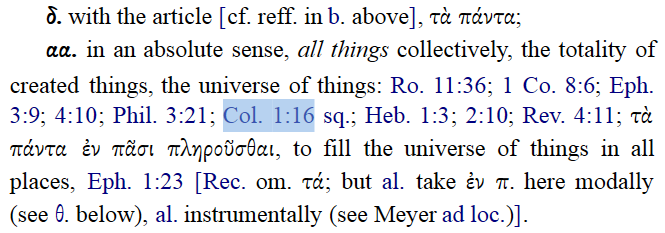I take εν αυτω as instrumental as in "with Jesus acting as his agent". However, this passage is not talking about making stuff but rather about "founding" the new regime, aka "the regime of his dear son". This is not talking about the making of Genesis 1 but rather of establishing a dominion. God, through his Anointed (designated to rule) has organized a government consisting of "seats" (offices), "dominions" (governments), "princes" (rulers) and "authorities" (people with executive powers). In other words, God established the "kingdom of his dear son" by the agency of his Christ. He made Jesus the "firstborn" both by his priority in time and in rank.
Notice that in the context of the discussion of the establishing Christ's kingdom the word translated "creation" in Col. 1:15 (κτίσις) refers to a "regime", not "stuff":
③ system of established authority that is the result of some founding
action, governance system, authority system. Corresponding to 1,
κτίσις is also the act by which an authoritative or governmental body
is created (ins in CB I/2, 468 no. 305 [I A.D.]: founding of the
Gerousia [Senate]. Somewhat comparable, of the founding of a city:
Scymnus Chius vs. 89 κτίσεις πόλεων). But then, in accordance with 2,
it is prob. also the result of the act, the institution or authority
itself 1 Pt 2:13 (Diod S 11, 60, 2 has κτίστης as the title of a high
official. Cp. νομοθεσία in both meanings: 1. lawgiving, legislation;
2. the result of an action, i.e. law.) To a Hellene a well-ordered society was primary (s. Aristot., Pol. 1, 1, 1, 1252). It was
understood that the function of government was to maintain such a
society, and the moral objective described in vs. 14 is in keeping
with this goal.—BBrinkman, ‘Creation’ and ‘Creature’ I, Bijdragen
(Nijmegen) 18, ’57, 129–39, also 359–74; GLampe, The NT Doctrine of
κτίσις, SJT 17, ’64, 449–62.—DELG s.v. κτίζω. M-M. TW. Sv.
Arndt, W., Danker, F. W., & Bauer, W. (2000). A Greek-English lexicon
of the New Testament and other early Christian literature (3rd ed., p.
573). Chicago: University of Chicago Press.
So even in the establishing and organizing the kingdom of his Christ, God is at work in him (Jesus) to will and to do of his own pleasure:
Col 1:17 And he [Jesus] is first [primary] in all things, and in him
[by God using Christ as his agent] all things hold together (persist).
Col 1:18 And he is the head of the body, the church. He is the
beginning, the firstborn from the dead, that in everything he might be
preeminent. Col 1:19 For in him [using Jesus as his agent] all the
fullness of God was pleased to dwell, Col 1:20 and through (διά)
him to [God would] reconcile to himself all things, whether on earth
or in heaven, making peace by the blood of his cross.
Here Paul describes clearly how God used and uses Jesus as his "agency" for accomplishing his will:
Col 1:19 For in him [by using Jesus as his agent] all the fullness of
God was pleased to dwell, Col 1:20 and [God] through him [Jesus] to
reconcile to himself [to God] all things, whether on earth or in
heaven, [God] making peace by (διά) the blood of his [Jesus'] cross.
Col 1:21 And you, who once were alienated and hostile in mind, doing
evil deeds, Col 1:22 he [God] has now reconciled in his [Jesus']
body of flesh by his [Jesus'] death, in order [for God] to present you
holy and blameless and above reproach before him [God],
The instrumental dative aka "dative of means" of ἐν then shows us that God is the actor and Jesus is acting at the bidding and for the pleasure of God.

